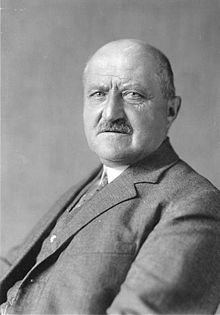Georg Michaelis
| Georg Michaelis | |
|---|---|
 |
|
| 6th Chancellor of the German Empire | |
|
In office 14 July 1917 – 1 November 1917 |
|
| Monarch | William II |
| Preceded by | Theobald von Bethmann Hollweg |
| Succeeded by | Georg von Hertling |
| Personal details | |
| Born | 8 September 1857 |
| Died | 24 July 1936 (aged 78) |
| Political party | None as Chancellor, later the German National People's Party |
| Religion | Lutheran |
Georg Michaelis (8 September 1857 – 24 July 1936) was Chancellor of Germany for a few months in 1917. He was the first Chancellor not of noble birth to hold the office. With an economic background in business Michaelis main achievement was to encourage the ruling-classes to open peace talks with Russia. Contemplating the end of the war was near he encouraged infrastructure development to facilitate recovery at war's end through the media of Mitteleuropa. A somewhat humourless character, known for process engineering, Michaelis was faced with insurmountable problems of logistics and supply in his brief period as Chancellor.
Michaelis, born in Haynau in the Prussian Province of Silesia, grew up in Frankfurt (Oder). He studied jurisprudence at the University of Breslau, the University of Leipzig and the University of Würzburg from 1876 to 1884, becoming a Doctor of Laws.
From 1885 to 1889 he lived and worked in Tokyo in Japan as a law professor of the Law School of the Society for German Sciences.
After his return to Germany he became a member of the Prussian administration. In 1909 he won appointment as undersecretary of state to the Prussian Treasury in Berlin. From 1915 onwards he headed the Reichsgetreidestelle, an office responsible for the administration of Prussian corn and wheat in World War I.
After the Reichstag and the High Command (OHL) forced the resignation of Theobald von Bethmann Hollweg on 10 or 13 July 1917, Michaelis emerged as the best candidate for both Chancellor of Germany and Minister President of Prussia. Hindenburg agreed because Michaelis was the army's man. He had visited the OHL on several occasions in his position as Undersecretary of State in the Prussian Ministry of Finance and Commissioner of Food Supplies. As an unknown to both parliament and the Kaiser he presented an oppositional figure to the Majority Parties in government. They knew not what to expect from this militarist.
...
Wikipedia
